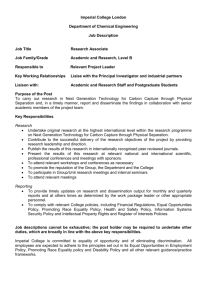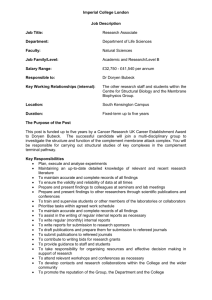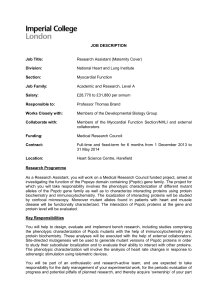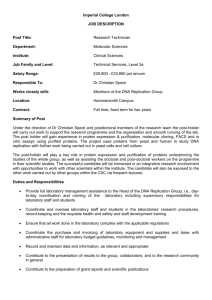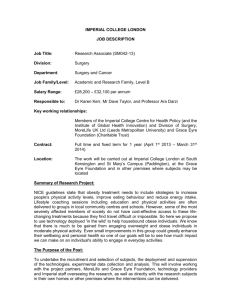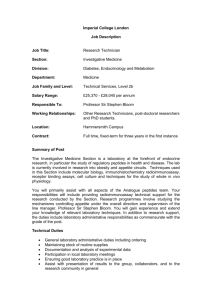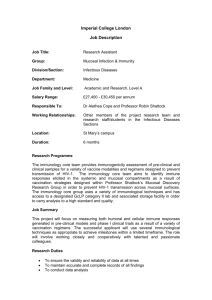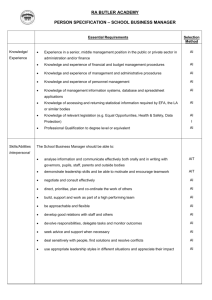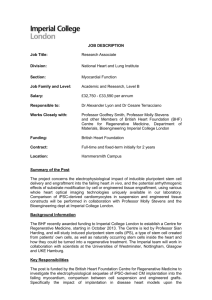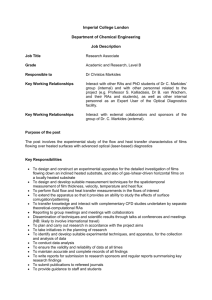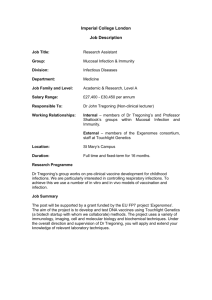Research Associate - Workspace
advertisement
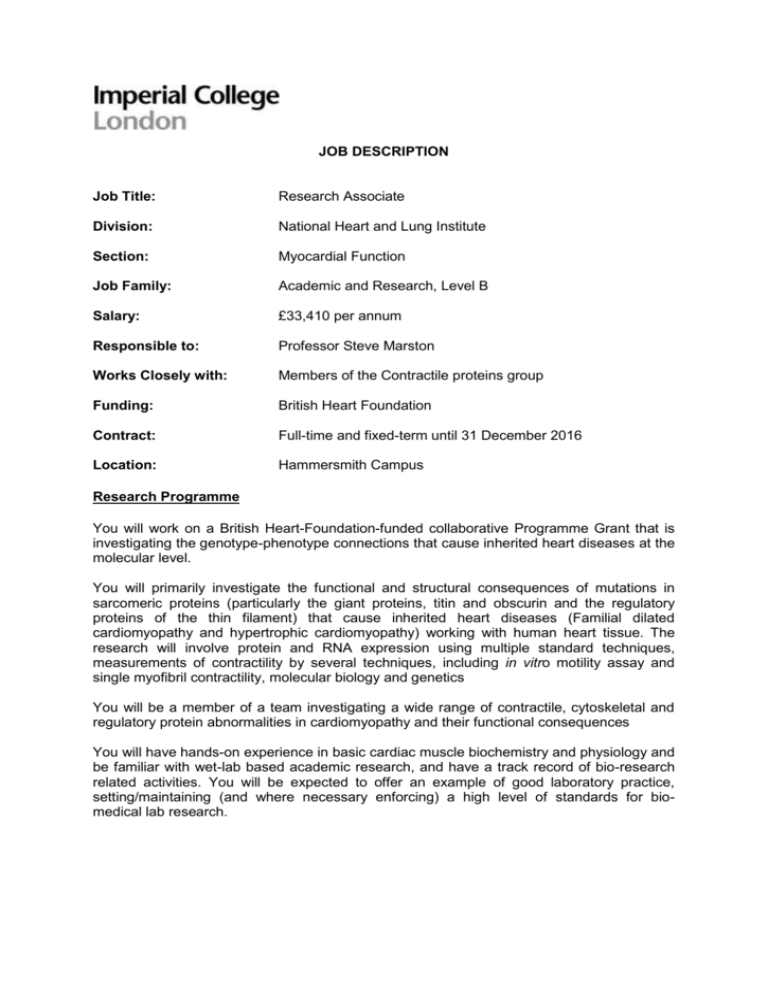
JOB DESCRIPTION Job Title: Research Associate Division: National Heart and Lung Institute Section: Myocardial Function Job Family: Academic and Research, Level B Salary: £33,410 per annum Responsible to: Professor Steve Marston Works Closely with: Members of the Contractile proteins group Funding: British Heart Foundation Contract: Full-time and fixed-term until 31 December 2016 Location: Hammersmith Campus Research Programme You will work on a British Heart-Foundation-funded collaborative Programme Grant that is investigating the genotype-phenotype connections that cause inherited heart diseases at the molecular level. You will primarily investigate the functional and structural consequences of mutations in sarcomeric proteins (particularly the giant proteins, titin and obscurin and the regulatory proteins of the thin filament) that cause inherited heart diseases (Familial dilated cardiomyopathy and hypertrophic cardiomyopathy) working with human heart tissue. The research will involve protein and RNA expression using multiple standard techniques, measurements of contractility by several techniques, including in vitro motility assay and single myofibril contractility, molecular biology and genetics You will be a member of a team investigating a wide range of contractile, cytoskeletal and regulatory protein abnormalities in cardiomyopathy and their functional consequences You will have hands-on experience in basic cardiac muscle biochemistry and physiology and be familiar with wet-lab based academic research, and have a track record of bio-research related activities. You will be expected to offer an example of good laboratory practice, setting/maintaining (and where necessary enforcing) a high level of standards for biomedical lab research. Research Duties To assist in the implementation of BHF-funded research To perform experiments with the aim to analyse the effects of functional and structural consequences of mutations in giant sarcomeric proteins To perform experiments with the aim to analyse the effects mutations and small molecules on the modulation of Ca2+-sensitivity by TnI phosphorylation To undertake wet-lab research To lead responsibility for project planning, scheduling, and implementation and independent preparation, execution, analysis, and interpretation of experiments To assist with daily coordination of laboratory research activities within the group. In this context, you will ensure good laboratory practice To undertake literature searches and reviews in support of your work To assist in preparing scientific papers for publication To assist with the writing of reports to research sponsors To work co-operatively as part of a multidisciplinary team and contribute to the smooth running of the project To contribute to other areas of work in the NHLI, if appropriate, including presenting seminars on your work To conduct and plan own scientific work with appropriate supervision To maintain highly organised and accurate record of experimental work To conduct data analysis, ensuring the validity and reliability of data at all times To provide training and advice to research and technical staff and visiting students, as dictated by the varying needs of the individuals To contribute to the intellectual activities of the laboratory To contribute to the smooth running of the Group’s laboratories and, facilities with other scientists, clinicians, technicians and students within the Section To contribute to the preparation of scientific publications To participate in Group research meetings and attendance/contribution at internal and external seminars and meetings. To present findings to colleagues and attend relevant workshops and conferences To keep up-to-date with scientific advances in the field, including continuing professional development To collaborate with other allied scientists within Imperial College and elsewhere in London and abroad, as appropriate To assist in the supervision of undergraduate and postgraduate research students and research assistants as required To undertake any necessary training To ensure maintenance of a clean, healthy working environment To undertake appropriate administrative tasks Any other duties which may arise commensurate with the grade of the post as directed by the Head of Group Other Duties To undertake appropriate administration tasks To attend relevant meetings To undertake any necessary training and/or development To observe and comply with all College policies and regulations, including the key policies and procedures on Confidentiality, Conflict of Interest, Data Protection, Equal Opportunities, Financial Regulations, Health and Safety, Imperial Expectations (for new leaders, managers and supervisors), Information Engagements and Register of Interests, and Smoking. Technology, Private To undertake specific safety responsibilities relevant to individual roles, as set out on the College Website Health and Safety Structure and Responsibilities page (http://www3.imperial.ac.uk/safety/policies/organisationandarrangements). Job descriptions cannot be exhaustive and the post-holder may be required to undertake other duties, which are broadly in line with the above key responsibilities. Imperial College is committed to equality of opportunity and to eliminating discrimination. All employees are expected to adhere to the principles set out in its Equal Opportunities in Employment Policy, Promoting Race Equality Policy and all other relevant guidance/practice frameworks. IMPERIAL COLLEGE LONDON PERSON SPECIFICATION Qualifications Essential Must have submitted or been awarded a PhD in Biochemistry or Physiology or a related discipline, or equivalent research, industrial or commercial experience Experience and Knowledge Essential Research capability demonstrated by publications Demonstrable experience in measurements of muscle contractility Hands-on knowledge of basic research methods relevant to analysis of DNA, RNA and protein expression. A thorough understanding of the molecular biology and genetics of cardiomyopathies. Practical expertise in data analysis and statistical procedures to support experimental design and data interpretation Knowledge of general wet-lab techniques, instrumentation, and maintenance Previous experience in adhering to or implementing of good laboratory practice in a research laboratory environment, either in academia or industry Good understanding of health & safety regulations applicable to laboratory work Desirable Experience with measuring contractility Hands-on expertise in gel electrophoresis and western blotting Good practical understanding of biochemistry and related laboratory techniques Ability to critically review project progress, and to provide intellectual input into the continued development of research Thorough knowledge of, or willingness to learn, procurement procedures Knowledge of scientific software including LabView and image J Skills and Abilities Essential Ability to develop and apply new concepts Ability to work constructively and effectively within a small team. Excellent written and verbal communication skills, with particular emphasis on writing succinctly for publication Ability to critically analyse data and to interpret accurately Creative approach to problem-solving Computer literate including word processing, graphing programmes, e-mail, and image analysis Attention to detail Proven organisational skills and ability to plan ahead, set priorities and work to deadlines Ability and willingness to perform routine and non-routine tasks effectively and within deadlines Ability and willingness to adapt to changing timetables or work patterns as may be dictated by changing circumstances. Ability and willingness to use personal initiative to accomplish tasks in an efficient and timely manner Other Requirements Active involvement with daily running and functioning of the laboratory Willingness to work as part of a team and to be open-minded and cooperative Flexible attitude towards work
